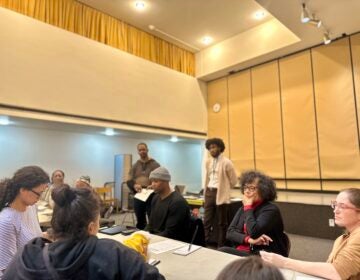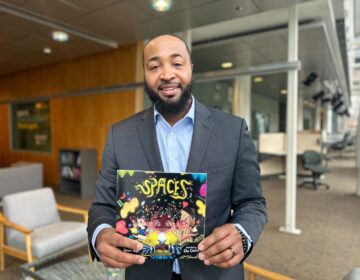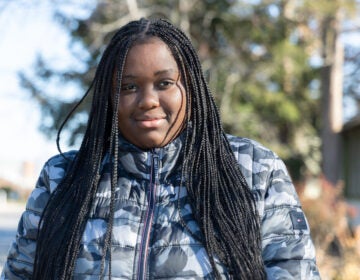‘Young, Unhoused and Unseen’ | Episode 1: The money
Getting federal funding to address youth homelessness is predicated on the success of Philly’s programs over the next two years.
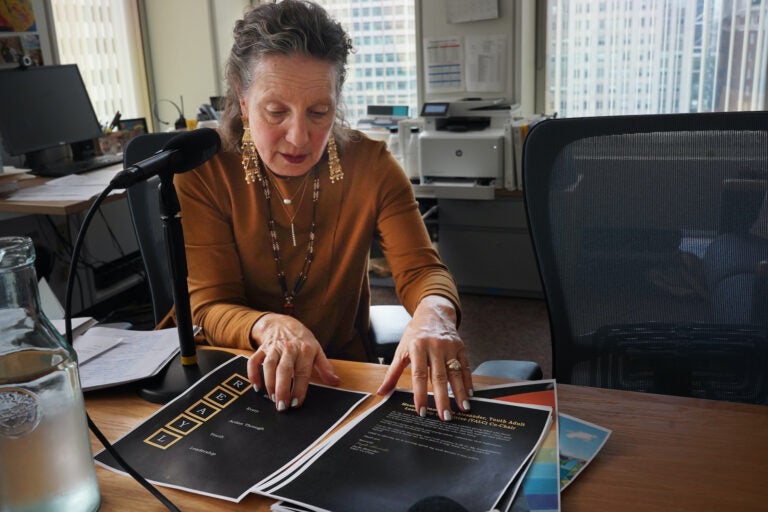
Liz Hersh, the former executive director of the City of Philadelphia’s Office of Homeless Services, breaks down the city's Coordinated Community Plan, which has the goal of making young adult homelessness 'rare, brief, and non-recurring.' (Kenny Cooper/WHYY)
This episode is from Young, Unhoused and Unseen, a podcast production from WHYY News and Temple University’s Logan Center for Urban Investigative Reporting.
Find it on Apple Podcasts, Spotify, or wherever you get your podcasts.
-
Episode transcript
SARAH GLOVER: I’M SARAH GLOVER, WHYY’S VP OF NEWS AND CIVIC DIALOGUE. IN YOUNG, UNHOUSED AND UNSEEN, WE EXPLORE YOUTH HOMELESSNESS IN GEN Z, ITS ROOT CAUSES AND SOLUTIONS. WE PRACTICE EMPATHY AND CENTER COMMUNITY VOICES IN OUR REPORTING WITH TEMPLE UNIVERSITY’S LOGAN CENTER FOR URBAN INVESTIGATIVE REPORTING. THANK YOU FOR TAKING THIS JOURNEY WITH US AS WE EXAMINE THE ISSUES.
KENNY COOPER: CONTENT WARNING: THIS EPISODE CONTAINS DESCRIPTIONS OF TRAUMA AND SEXUAL ABUSE.
Michelle Neal: Can you see me as I walk through the halls? Can you tell that I’m hiding something deep down inside? As I smile and laugh, I’m crying inside, hoping no one asks about my home life.
MUSIC
YVONNE LATTY: THAT’S AN EXCERPT OF A POEM WRITTEN AND PERFORMED BY MICHELLE NEAL.
IT’S A FULL PAGE INSIDE A SUCCESSFUL HOUSING AND URBAN DEVELOPMENT GRANT PROPOSAL TITLED “LET’S END YOUTH HOMELESSNESS IN PHILLY!”
MICHELLE IS 28 AND LIVES AT PROJECT HOME, A NON PROFIT THAT PROVIDES HOUSING, EDUCATION AND SUPPORT FOR THE UNHOUSED. SHE HAS BEEN IN AND OUT OF HOMELESSNESS SINCE SHE WAS A TEEN. HER STORY IS ONE OF ABUSE, HARDSHIP AND NOW LEADERSHIP.
MUSIC
YVONNE: I’M YVONNE LATTY, THE DIRECTOR OF TEMPLE UNIVERSITY KLEIN COLLEGE’S LOGAN CENTER FOR URBAN INVESTIGATIVE REPORTING.
KENNY: AND I’M KENNY COOPER, A REPORTER AT WHYY NEWS. THIS IS YOUNG, UNHOUSED, AND UNSEEN, A PODCAST THAT LOOKS AT WHO PHILADELPHIANS SEE AND UNSEE EVERY DAY: HOMELESS YOUNG PEOPLE.
THIS IS EPISODE 1: THE MONEY.
HOMELESSNESS IN OUR REGION LOOKS REALLY DIFFERENT THAN IT DOES ON THE WEST COAST, WHERE TENT CITIES IN HIGH-END AREAS LEAD TO ENDLESS NEWS STORIES EVEN THOUGH HOW HOMELESSNESS REALLY LOOKS THERE IS VARIED .
Reporter: This large homeless encampment blocking the sidewalk on either side, spilling into the street.
Reporter: A sweep happened a few days ago here, too. Now these eco blocks line the curves and sidewalks, and business owners here tell me that when a sweep happens, they put these out in hopes tents don’t go back up.
Reporter: In some cases, these people can turn violent and there’s no choice but to call 911. But what happens when you call?
Resident: To be honest, I don’t call the cops. They won’t come.
KENNY: IN PHILLY, WE SEE ADULT HOMELESS PEOPLE IN CENTER CITY AND COLUMBUS BOULEVARD. SOME SLEEP UNDER THE VINE STREET EXPRESSWAY. THOSE SUFFERING FROM ADDICTION WANDER UNDER THE EL IN KENSINGTON AND SOME HOMELESS PEOPLE ARE LIVING WITH MENTAL HEALTH ISSUES.
THERE ARE THE OCCASIONAL BIG ENCAMPMENTS, LIKE THE ONE AT THE BENJAMIN FRANKLIN PARKWAY A FEW YEARS AGO.
Reporter: This is at 22nd and the parkway. Now you can see dozens of tents right across from the Barnes Museum. It was organized by activists and protestors raising the issue of homelessness and affordable housing.
Reporter: The city announced that the protest encampment on the parkway would be cleared by this Friday, July 17th. The tents, at times numbering more than two hundred in this fight for permanent housing.
Reporter: So how is the area responding to its new neighbors? One woman says she understands why they are doing this right now, but hopes that it does not draw out into anything long term.
Resident: There’s so many vacant houses in the city of Philadelphia. You know, why can’t the city do something for people that don’t have a place to live?
MUSIC
KENNY: WHAT ISN’T AS VISIBLE ARE HOMELESS YOUTH AND YOUNG ADULTS.
IN FISCAL YEAR 2022, PHILADELPHIA’S OFFICE OF HOMELESS SERVICES SERVED 1,574 YOUNG PEOPLE. THAT’S NINE PERCENT OF THE CITY’S HOMELESS POPULATION, MOST OF WHOM LIVE IN SHELTERS.
BUT CRITICS SAY THE NUMBER OF HOMELESS YOUTH AND YOUNG ADULTS IS DIFFICULT TO COUNT.
PHILADELPHIA, LIKE OTHER BIG CITIES, USES POINT IN TIME COUNTS TO GAUGE THE NUMBER OF HOMELESS PEOPLE ON THE STREETS.
CITY VOLUNTEERS FAN OUT ACROSS PHILLY AND COUNT EVERY HOMELESS PERSON THEY SEE, AND THOSE IN SHELTERS, FOR TWO DAYS IN JANUARY, THE COLDEST MONTH OF THE YEAR. THE LAST COUNT WAS ON JANUARY 25, 2023, AND FOUND 273 UNACCOMPANIED YOUTH AND 95 YOUNG HOMELESS PARENTS.
Kenny: What’s wrong with the point in time count?
David Fair: They do it once a year, that’s what’s wrong with it.
KENNY: THAT’S DAVID FAIR. HE IS THE DEPUTY CHIEF EXECUTIVE OFFICER OF TURNING POINTS FOR CHILDREN AND CO-CHAIR OF PHILLY HOMES FOR YOUTH, A COALITION COMMITTED TO ENDING YOUTH HOMELESSNESS.
David: If they did it every week, if they did it every month, we would, we could average out what they’re finding and have it better. And if they did it throughout the whole city, they don’t do it throughout the whole city. They do it in pockets where they know there are populations of homeless people.
KENNY: HE ESTIMATES THE NUMBER OF YOUNG HOMELESS PEOPLE IS VERY DIFFERENT THAN HUD’S POINT IN TIME COUNTS.
David: I would say half of the homeless youth in Philadelphia are living on couches, couch the couch every night. You’re not going to find them through a point in time count. You’re not going to find the sex workers through a point in time count. You know, you’re not going to find the ones who are dealing drugs or addicted to drugs necessarily through a point in time count that you do once a year.
KENNY: HE SAYS THE COUNTS ARE TOO RANDOM.
David: If you pick the wrong night, if it’s a nice night or if it’s not a nice night. And the kids are, it’s freezing and people don’t go out in the street, they’re hiding someplace else, you’re not going to count them.
YVONNE: MICHELLE WAS THE LEAD CO-AUTHOR OF A U.S DEPARTMENT OF HOUSING AND URBAN DEVELOPMENT COORDINATED COMMUNITY PLAN. IT IS DESIGNED TO CHANGE THE TRAJECTORY OF THE LIVES OF HUNDREDS OF YOUNG ADULTS WHO HAVE EXPERIENCED HOMELESSNESS.
IT’S A PROPOSAL FILLED WITH HOPE AND A ROADMAP ON HOW TO SOLVE THE HEARTBREAK AND PAIN OF THE YOUNG PEOPLE WHO SLEEP ON COUCHES, IN CARS AND ON SEPTA; THE ONES WHO LIVE IN SHELTERS, GROUP HOMES AND ON THE STREETS.
PHILLY’S APPLICATION AND PLAN NETTED PHILADELPHIA‘S OFFICE OF HOMELESS SERVICES ROUGHLY $8.8 MILLION DOLLARS.
LIZ HERSH, THE FORMER DIRECTOR OF THE PHILADELPHIA OFFICE FOR HOMELESS SERVICES, OR OHS, SAYS IT TOOK EIGHT MONTHS AND 40 YOUNG ADULTS TO COMPLETE THIS COMPREHENSIVE PLAN.
Yvonne: With all the problems that Philadelphia is facing, this is one problem that can be solved.
Liz: Oh, yeah, it can totally be solved.
YVONNE: OHS HAS TAKEN A LOT OF HEAT FOR NOT DOING A GREAT JOB OF COUNTING HOMELESS YOUNG PEOPLE.
Liz: We think there’s a lot that we’re not capturing. We know that what we have is an undercount and that a lot of young people don’t come into the homeless system for a variety of reasons.
YVONNE: BUT WHAT SHE IS PROUD OF IS THIS GRANT AND THE YOUNG PEOPLE WHO PRODUCED IT.
Liz: They had a whole year of training, like they came every week for 2 hours and learned about HUD and what all the different programs are and the funding sources. And then they had the skill base to match all of that expertise that allowed them to talk to policymakers like us and decision makers. But then they could take their own experience and expertise and put it into that framework.
So our plan to end youth homelessness was actually developed by young adults who themselves have experienced homelessness, and it reflects what they want to accomplish, their values, their experiences, their needs. And it’s different than what you and I might come up with.
YVONNE: PHILADELPHIA WAS ONE OF 17 COMMUNITIES AWARDED THE GRANT THROUGH HUD’S YOUTH HOMELESSNESS DEMONSTRATION PROGRAM.
Jemine Bryon: Gives the communities with full participation of youth with lived experience of homelessness, gives them an opportunity to really design innovative approaches to address the individual needs of that community for youth.
YVONNE: THAT’S JEMINE BRYON. SHE’S HUD’S DEPUTY SECRETARY FOR THE OFFICE OF SPECIAL NEEDS. SHE SAYS SINCE 2016 THIS PROGRAM HAS AWARDED $437 MILLION TO FUND NEW AND INNOVATIVE PROGRAMS TO HELP HOMELESS YOUNG ADULTS.
Jemine: We’ve done seven rounds of awards to about 110 communities across the United States. And in a nutshell, the goal of the Youth Homelessness Demonstration program is to support selected communities and their development and implementation of a coordinated community approach to addressing youth homelessness, or to really assist those youth who are at risk of homelessness.
YVONNE: HERSH RESIGNED FROM HER POSITION ON OCTOBER 13th, 2023, SHORTLY AFTER THIS INTERVIEW. SHE HELD THE POSITION FOR SEVEN YEARS.
Liz: I think that the young people themselves have done a really good job of speaking up for themselves and raising their hand and say, Yo, we need help, we need more.
MUSIC
YVONNE: SHE SAYS HOMELESSNESS, LIKE THE CITY’S GUN VIOLENCE EPIDEMIC, POVERTY AND MANY OF THE CITY’S OTHER CRUSHING ISSUES FALLS ON THE BACKS OF PHILLY’S BLACK CITIZENS.
Liz: 88 percent of the people who enter our system and get housed through our system are Black or African-American. It’s 43 percent of the population. That’s not an accident, right. This is, you know, the human cost of our history of enslavement and Jim Crow and mass incarceration and all of those things. That’s not a coincidence. Right. I mean. Homelessness is one of the ways that our, you know, long history, a long shameful history of racism, you know, gets played out and, you know, at great cost to young people and older people, but especially men who are Black and brown.
YVONNE: BUT HERSH SEES ALL OF THIS AS A CALL TO ACTION.
Liz: Well, to me, one of the silver linings out of, you know, George Floyd’s murder and the Black Lives Matter movement and this whole new era of racial awakening and reckoning, this racial reckoning, you know, and I’m old so I’ve been through several iterations now, is that I think people have begun to see that homelessness is about race. Right. It is. It’s about the economics of race and opportunity. It is about race, you know, having such a big impact on what your opportunities are in your life.
MUSIC
Liz: So to me, the work that we do in housing people is definitionally anti-racist because you can’t get a job, hold a job, reunite with family, go to school, succeed in school, and, you know, have a recovery, be healthy without a place to live. And if you have that place to live, it changes everything in your life. And it gives you a platform to figure out and what you want for yourself and to be able to get it.
YVONNE: HERSH BELIEVES THE HUD FUNDING COULD HELP CHANGE YOUNG LIVES IN A CITY FULL OF HOUSING EXTREMES.
Liz: Castles and cardboard boxes. The two extremes. Yeah, we’ve made a lot of progress. You know, our our numbers of people who are unsheltered are down. Chronically homeless, those numbers are down. Families, family, homelessness, all of those things. We have made a lot of progress, but there’s a lot more to do.
YVONNE: IF YOU WALK THOUGH CENTER CITY, THERE SEEMS TO BE ON EVERY BLOCK FOLKS BEGGING AND HUSTLING. SOME PEOPLE LOOK LIKE THEY’RE IN THE MIDDLE OF A MENTAL HEALTH CRISIS. OTHERS ARE HOLDING THEIR POSSESSIONS IN SHOPPING BAGS, OVERWHELMED BY THE POVERTY THAT HAS LED THEM TO THE STREETS.
Liz: I think that one of the things about Philly is it’s a very tight center city, right our downtown, and it’s a very much of a walking town. And so I think you do more encounter more people. So, yeah, we’ve made progress. I think nationally, relatively speaking, we’re doing very, very well. But is it enough? Is it good enough? No, we have a long way to go, a lot of people who need a lot more than we’re giving them.
MUSIC
KENNY: FAIR SAYS THE ONLY ANSWER IS MONEY SPREAD THROUGHOUT THE SYSTEM.
David: What we really need is, in my opinion, we need $8 million at OHS. We need $8 million at DHS. We need $8 million at the Department of Behavioral Health. We need $8 million at the Recreation Department. We need $8 million in any part of city government that touches young people and create a system for what we used to call opportunity youth, 18 to 24.
KENNY: HERE IS WHERE HERSH AND FAIR AGREE: IF WE CAN SOLVE HOMELESSNESS FOR YOUNG ADULTS, WE COULD END THE CITY’S HOMELESS CRISIS AS WE KNOW IT.
David: Kids 18 to 24, we’re not going to have 30-year-old homeless people. You’re not going to have 50-year-old homeless people in the future because we will have solved their problem when it was still more easily solved.
KENNY: BUT BRYON DOES NOT SEE THIS RECENT FUNDING AS A CLEAR PATH FOR ENDING THE CITY’S CYCLE OF HOMELESSNESS.
Jemine: Because youth homelessness requires continuing partnerships and continuing investments from a number of systems, not just the homelessness system. Right. We’ve got to look at child welfare, juvenile justice, the education system, both post-secondary education and K through 12 and other partners.
This funds, I mean it certainly, under the YHDP program, provides a catalyst for that investment and for creating these partnerships and systems. And it’s hard to say, right? It’s for in the case of Philadelphia, it’s yet to be determined whether they are on a good path for ending youth homelessness in X period of time. It’s really unknown.
KENNY: THE HUD GRANT CAN BE RENEWED, SO THIS PIPELINE OF FUNDING COULD CONTINUE.
Jemine: After the two years, then these projects are eligible for automatic renewal on an annual basis. So it is in place as long as there is, you know, performance, great outcomes and application for renewal.
MUSIC
Yvonne: Hey, Kenny.
Kenny: Hey.
Yvonne How are you?
Kenny: I’m good, how are you?
Yvonne: Good. Good.
Kenny: Ready?
Yvonne: Well, we’re early.
Kenny: Yeah
Yvonne: Let’s do it.
KENNY: YVONNE AND I MEET AT THE OPENING EVENT FOR SELF INC’S NEW OFFICE IN CENTER CITY. IT’S A CELEBRATION OF THEIR SOON-TO-BE-OPENED YOUNG ADULT GROUP HOME CALLED MISS BARBARA’S HOUSE. THE FACILITY WAS FUNDED BY $1 MILLION OF THE HUD GRANT.
Dr. Shirlana Dash: Kids living in the streets should not be.
KENNY: SELF INC HAS BEEN AROUND FOR 41 YEARS AND IS THE LARGEST PROVIDER OF EMERGENCY HOUSING IN THE CITY. A CROWD SITS AND GATHERS IN THEIR CONFERENCE ROOM AS SELF INC DIRECTOR SHIRLANA DASH STANDS AND TALKS ABOUT THEIR MISSION.
Dr. Dash: The work that we every day do is life changing. And so we thank you all for taking the time to come out and kind of talk to us and see who we are, what we’re here for. We’re excited. Self has over seven shelters, over 36 scattered housing, and we’re growing and expanding.
KENNY: MISS BARBARA’S HOUSE IS PERSONAL TO DR. DASH. IT’S NAMED AFTER HER MOTHER, WHO LIVED IN NORTH PHILLY AND HELPED NEIGHBORHOOD CHILDREN IN NEED.
MISS BARBARA’S HOUSE WILL BE THE ORGANIZATION’S FIRST TRANSITIONAL HOME FOR YOUNG PEOPLE WHO ARE HOMELESS.
THERE WILL BE PARTNERSHIPS, WITH TRADE UNIONS FOR APPRENTICESHIPS, MENTORSHIPS TO HELP THEM GET JOBS WITH LIVABLE WAGES AND EVERYTHING THEY NEED TO LIVE PRODUCTIVE LIVES.
Dr. Dash: But today we’re kind of talking about Miss Barbara’s house, what the goal is. We have one mission, but we’re here to help homelessness stop in this city. And it starts with one program, one person, one helping hand at a time.
KENNY: SITTING AT THE CONFERENCE TABLE IS BOARD MEMBER AND FORMER PHILLY MAYOR WILSON GOODE.
Wilson Goode: There’s no way that all of the resources that this city has and that not only from the city government itself, but also from people who live here, there’s enough additional resources in this city to make sure that these young people have a place to sleep at night and food to eat. And we have to just do that. We have to do it.
MUSIC
Michelle: I was in foster care from 16 until I was 21. When I aged out of foster care, I ended up going into transitional housing.
YVONNE; THAT’S MICHELLE NEAL, THE POET AND LEAD GRANT WRITER WE HEARD FROM EARLIER. SHE IS AN INTERN AT OHS’S YOUTH HOMELESS DEMONSTRATION PROGRAM, WHERE SHE HELPS FACILITATE AND PLAN MEETINGS AND ORGANIZE EVENTS.
SHE ENTERED FOSTER CARE AT 16. HER MOTHER HAD UNTREATED MENTAL HEALTH ISSUES AND THE MENTAL AND PHYSICAL ABUSE STARTED EARLY.
Michelle: Growing up, it was hard. I was sexually abused multiple times throughout my whole entire life. My first encounter with sex was actually at two and a half years old.
YVONNE: MICHELLE AGED OUT OF FOSTER CARE AT 21 AND INTO A CYCLE OF HOMELESSNESS. THIS IS HOW SHE DESCRIBES HER LIFE IN WHAT SHE CALLED AN “ABANDOMINIUM,” A HOUSE WITH NO ELECTRICITY OR RUNNING WATER THAT SHE LIVED IN FOR MONTHS.
Michelle: We did get electricity, but it was from the next door neighbor, so it was a lot of extension cords. I wasn’t able to take showers or a bath because there was no running water. When you had to go to the bathroom, you had to actually pee and take a number two in buckets. So it was kind of, you know, really hard.
We both had to sleep in the same bed because he was a hoarder, so none of the other bedrooms were able to be slept in. The kitchen was not accessible whatsoever. I was already diagnosed with diabetes at the time and needed insulin, which I didn’t need technically living with him, because I was malnourished and so I didn’t really get a lot of high sugary foods.
YVONNE: MICHELLE SAYS SHE WAS BEING ABUSED BOTH PHYSICALLY AND MENTALLY BY THE COUSIN SHE WAS LIVING WITH.
Michelle: He decided to try to physically kill me.
MUSIC
Michelle: He started by removing clothes that was underneath a window that wasn’t properly sealed, and at that time it was a Code Blue. So it was really hard. He removed the blankets that he had given me at the time and decided to crack my door and put the fan on so that I would try to freeze to death.
YVONNE: AFTER LEAVING, SHE MOVED TO A SHELTER, THEN TO A COUCH, AGAIN AND AGAIN, ALWAYS BEING MET BY HARDSHIP AND ABUSE.
NOW SHE IS LIVING AT PROJECT HOME IN A BUILDING WITH SUPPORTIVE SERVICES FOR YOUNG LGBTQ PEOPLE. ABOUT 25 TO 40 PERCENT OF HOMELESS YOUNG PEOPLE IN PHILADELPHIA IDENTIFY AS LGBTQ.
Michelle: It’s much more harder for LGBT because of the fact of it’s not enough shelters or just organizations that focus on LGBT. And the problem is, when you get into just regular ones and people find out, it makes it really hard or unsafe for you because of homophobics.
Yvonne: Did you ever feel unsafe in a shelter because you’re bisexual?
MUSIC
Michelle: Yes. Um, the first shelter that was in, a few of the residents there did not like that I was the way that I was. And sometimes it would target bullying for that reason alone, of, oh, I can’t believe it. Or oh, you probably with that person. And I’m just like, No, they’re just a housemate or, Oh, we don’t want you to be in this room because we’re scared that you’re going to see us with our clothes off. And we don’t feel comfortable with that. I don’t like you like that. You’re not my type, but it doesn’t matter because I am the way that I am. So even though I can say you’re not my type. Oh, why wouldn’t I be your type? Now you’re asking me why you wouldn’t be my type. Shouldn’t you be happy then, that you’re not my type? That I’m not looking at you like that? But they just didn’t care about that. It was just the fact that how dare someone be that way and in a room with me, now I don’t feel safe.
YVONNE: MICHELLE LEARNED ABOUT THE GRANT AT A PROJECT HOME KICKOFF EVENT.
Michelle: It was inspirational to me. I loved the concept and I loved the fact that they wanted to help youth. And I said, Well, not only do you want to help youth, but you want to help those with lived experience and actually pay them for their voice.
YVONNE: IT LED TO A PAID INTERNSHIP FOR HER AT OHS. THIS IS THE LONGEST JOB SHE HAS HELD DUE TO MULTIPLE DISABILITIES.
Michelle: I have PTSD, depression and anxiety. Like. So it makes it really hard for me to stay at working for long periods of time. The longest I worked before here was six months. Most jobs I only stay maybe a month to three months. So for me to be in this position for this long has been incredible and great opportunity. And I’m hoping that I stay as long as I possibly can.
YVONNE: THERE IS A LOT MICHELLE WANTS PEOPLE TO KNOW ABOUT BEING HOMELESS. SHE SAYS THERE ARE TOO MANY MISCONCEPTIONS, LIKE…
Michelle: That you wanted this or that you did something to deserve being homeless. That, oh, you don’t want to work or anything. That’s why you’re homeless or, oh, you must’ve, not managed your money properly. That’s why you lost your house or, you know, you must have messed with the wrong people. That’s why you got kicked out. Or you need to do better. You need to have better decision making skills.
And that’s not always the truth. Majority of people, it’s not that at all.
MUSIC
Michelle: You get kicked out from family members. You get kicked out because even though you’re working, you was not in a safe environment. So you rather be out on the streets than where you were or you don’t know any better, especially when it’s young people couch hopping. It has nothing to do with you making bad decisions. Maybe the best decision you had was couch hopping versus being in an abusive home or, you know, dealing with being completely on the streets or dealing with drugs or anything else like that. And it’s sad when people lose their home because it’s devastating. But like, but then sometimes it’s better to be on the streets than in that home environment.
YVONNE: YOUNG, UNHOUSED, AND UNSEEN IS A PRODUCTION OF WHYY NEWS AND TEMPLE UNIVERSITY KLEIN COLLEGE’S LOGAN CENTER FOR URBAN INVESTIGATIVE REPORTING. I‘M YVONNE LATTY, CO-HOST, SENIOR PRODUCER AND THE DIRECTOR OF TEMPLE’S LOGAN CENTER.
KENNY: I’M KENNY COOPER, COHOST, PRODUCER AND A REPORTER AT WHYY. OUR EXECUTIVE PRODUCER IS SARAH GLOVER, WHYY’S VP OF NEWS AND CIVIC DIALOGUE, OUR EDITORS ARE JORDAN GASS-POORE AND JAMILA BEY.
YVONNE: MUSIC BY DREW LEVINE. OUR ENGINEER IS AL BANKS. COLIN EVANS IS OUR DATA EDITOR. OUR PRODUCTION ASSISTANTS ARE ALLISON BECK AND NATALIE REITZ.
FUNDING FOR THIS PODCAST HAS BEEN PROVIDED BY WHYY, THE ANNIE E. CASEY FOUNDATION AND TEMPLE UNIVERSITY’S KLEIN COLLEGE FOR MEDIA AND COMMUNICATION.
KENNY: ADDITIONAL PRODUCTION SUPPORT WAS GIVEN BY JIM MACMILLIAN. SPECIAL THANKS TO THE JONATHAN LOGAN FAMILY FOUNDATION, SELF INC, THE HOMELESS NARRATIVE LAB, AND MICHELLE NEAL AND JAYDA ALEXANDER, WHO SHARED THEIR STORIES.
YVONNE: PLEASE RATE AND REVIEW WHEREVER YOU ARE LISTENING. AND HIT US UP ON SOCIAL. WE WANT TO HEAR FROM YOU. CHECK OUT OUR STORIES ON HOMELESSNESS AND THE HOUSING CRISIS IN THE PHILADELPHIA REGION ON WHYY.ORG PLEASE JOIN US IN THIS CONVERSATION. THANKS FOR LISTENING.
collapse
“Young, Unhoused and Unseen,” the podcast and multimedia project produced by WHYY News and Temple University’s Logan Center for Urban Investigative Reporting, examines youth homelessness in the Greater Philadelphia region and explores solutions to address the epidemic.
Awarded an $8.8 million grant by the U.S. Department of Housing and Urban Development in 2022, Philadelphia wants to bolster services for its unhoused youth. Some city officials are optimistic it could represent light at the end of the tunnel. If the city can find an effective solution to youth homelessness, could it find a more permanent fix?
For eight months, roughly 40 members of the Philadelphia Youth Homelessness Demonstration Program (YHDP) worked together to make young adult homelessness “rare, brief, and non-recurring.” The April 2023 Coordinated Community Plan, created by the youth for the youth, has been adopted as a roadmap to reducing the problem.
But finding solutions won’t be easy. Homelessness looks different for young people than it does for older adults. The population of young people experiencing homelessness is undercounted and fragmented and lacking resources. Getting another round of HUD funding is predicated on another application — and the success of Philadelphia’s programs over the next two years.
Jemine Bryon, HUD’s deputy assistant secretary for special needs, said reducing and possibly ending youth homelessness requires collaboration and continued investments across various systems, including “child welfare, juvenile justice, the education system, both post-secondary education and K through 12.”
“In the case of Philadelphia, it’s yet to be determined whether they are on a good path for ending youth homelessness in X period of time,” Bryon said. “It’s really unknown.”
In this episode, hear from Michelle, a young, unhoused co-author of the CCP, explain the challenges of youth homelessness.

Get daily updates from WHYY News!
The free WHYY News Daily newsletter delivers the most important local stories to your inbox.
WHYY is your source for fact-based, in-depth journalism and information. As a nonprofit organization, we rely on financial support from readers like you. Please give today.
Brought to you by Young, Unhoused and Unseen
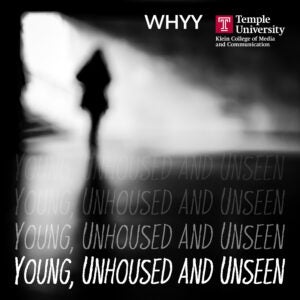
The nearly two-hour conversation centered on youth homelessness — a growing problem in the region, according to recent city data.
2 years ago
Listen 1:10A Philadelphia study finds that almost 25% of youth who experience homelessness find a way out, which researchers call resilience.
2 years ago
Listen 4:28Foster care experience, childhood abuse and trauma can affect housing stability, experts say
Nearly 60% of youth identified as “homeless” have experienced foster care, abuse or domestic violence, experts say.
2 years ago
Listen 2:37

